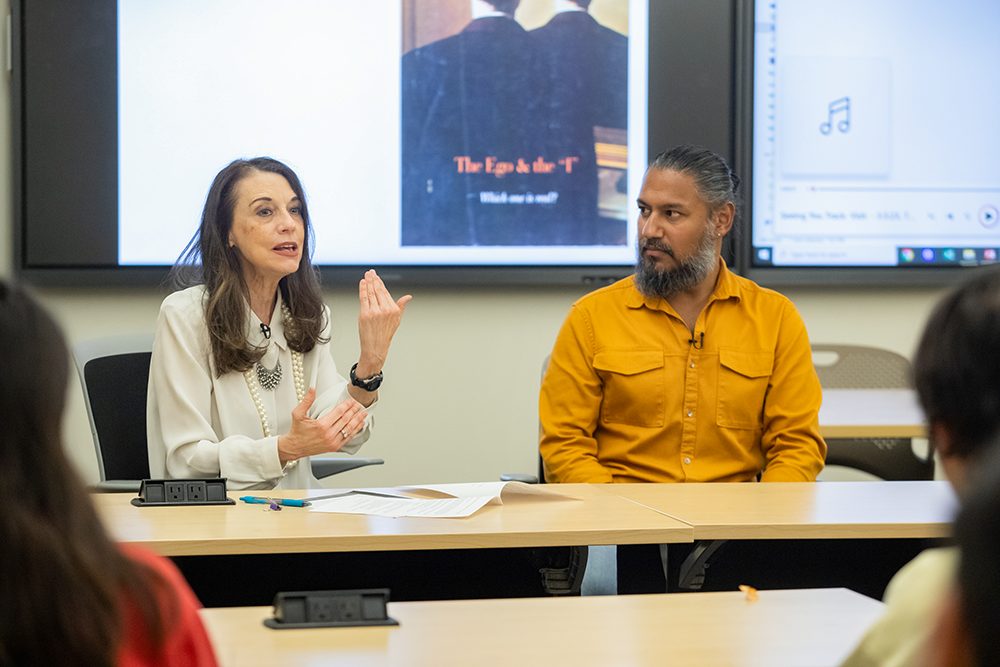
Takeaways:
- Broadway actor Vishal Vaidya spoke to Professor Deborah Natoli’s The Art and Science of Leadership class.
- Natoli connected themes and characters from the musical Groundhog Day to leadership scholarship and human development theories.
- Natoli’s class, which takes leadership lessons from poetry, physics, philosophy and more, received the Provost’s Interdisciplinary Teaching Grant Award.
Vishal Vaidya is not an obvious choice for guest speaker in a leadership class. He’s a Broadway actor who has performed across the country, not a CEO or management guru.
Yet this month, before his evening performance in Secret Garden at Los Angeles’s Ahmanson Theatre, Vaidya met with students in The Art and Science of Leadership class at USC’s Sol Price School of Public Policy.
In conversation with Professor Deborah Natoli, Vaidya talked about his role in the 2017 Broadway musical Groundhog Day.
He explained the show’s scenes, themes and character arcs, while Natoli connected those to leadership scholarship and human development theories. Then, with the class of 19 students looking on, Vaidya belted out a tune from the Broadway musical.
Vaidya is an unconventional guest speaker for sure, but Natoli runs an unconventional leadership class. Modeled after a leadership class from USC scholar Warren Bennis and former USC President Steven Sample 20 years ago, The Art and Science of Leadership is designed for a new generation of Trojans. It goes well beyond traditional approaches to leadership, taking leadership lessons from poetry to psychology, film to fine art, and physics to philosophy.
“We’re looking at how to become a whole and fulfilled human being,” Natoli said. “There’s universal wisdom in literature, in poetry. We don’t have to just look at theories of leadership.”
“The state of our social systems and divisiveness in our world calls upon us to reframe what it means to lead,” Natoli added.
Natoli received the Provost’s Interdisciplinary Teaching Grant Award for the class and syllabus. That has funded presentations from Vaidya and a mindfulness instructor who has twice visited the class.
Groundhog Day, based on the film of the same name, follows arrogant TV weatherman Phil Connors, who gets stuck in a time loop repeating the same day. Vaidya, who played Larry the cameraman, described Phil’s character development from a narcissist to a caring individual.
“He is a leader from the jump, but he’s not doing a very good job,” Vaidya told students. “All of these people look up to him, and he treats them all terribly. I think it isn’t until he goes through this journey of awareness that he’s able to truly do what he’s supposed to.”
“And when he has that better sense of who he is,” Natoli added, “he can look at people as they truly are, as he has more authentic power and is not looking for external, superficial power.”
Vaidya ended the lecture by singing “Seeing You” from the musical.
“I thought the only way to better days was through tomorrow. But I know now that I know. And I know now I know nothing. But I’m here. And I’m fine. And I’m seeing you for the first time.”
Peter Ji, a junior studying public policy at the USC Price School, was inspired by Vaidya’s personal story as a first-generation Indian-American who pursued acting – despite pressure to follow cultural expectations.
“He eventually got the courage and determination to go against those traditions and be his real self, and I just think that is very powerful,” Ji said.
“We’re looking at how to become whole and fulfilled human beings,” Natoli said, “to develop habits of mind to address nuances and complexities of a situation in life’s navigations.”
Natoli has spent her career supporting the development of students, teachers and leaders. She came to USC in 2006 as director of faculty development at the Marshall School of Business, where she received a Dean’s Award for raising student ratings of teaching scores.
USC University Professor and Distinguished Professor of Business Administration Warren Bennis, an internationally recognized authority on leadership, inspired her to expand her model for teacher development to leadership.
“Watching human beings become more of who they are meant to be, to manifest a fullness of potential, that’s been my life’s work,” she said.